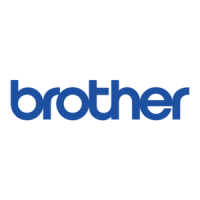HL-2030/2040/2070N SERVICE MANUAL
Confidential
2-17
Printing on envelopes
Use of any of the envelopes listed below may cause damage to the printer.
• Envelopes that are damaged, curled, wrinkled, or unusual shape
• Envelopes that are extremely shiny or highly textured
• Envelopes with clasps, snaps or tie strings
• Envelopes with self-adhesive closures
• Envelopes of baggy construction
• Envelopes that are not sharply creased
• Embossed envelopes
• Envelopes that were previously printed by a laser printer
• Envelopes that are pre-printed on the inside
• Envelopes that cannot be arranged when put in a pile
• Envelopes made of paper that the weighs more than the paper weight specifications for
the printer.
• Envelopes that have been badly made, with edges that are not straight or consistently
square.
• Envelopes with windows, holes, cutouts or perforations.
WARNING
• If you use any of the types of envelopes listed above, they may damage your
printer. This damage is not covered under any Brother warranty or service
agreement.
NOTE:
• Before printing on envelopes, fan the stack well to avoid paper jams and misfeeds.
• Do not put different types of paper at the same time in the paper tray because it may cause
paper jams or misfeeds.
• Do not print on envelopes using manual duplex printing.
• For proper printing, you must choose the same paper size from your software application as
the paper in the tray.
• Most envelopes will be suitable for your printer. However, some envelopes will have feed
and print-quality problems because of the way they have been made. A suitable envelope
should have edges with straight, well-creased folds and the leading edge should not be
thicker than two pieces of paper. The envelope should lie flat and not be of baggy or flimsy
construction. You should buy quality envelopes from a supplier who understands that you
will be using the envelopes in a laser printer. Before you print a lot of envelopes, test one to
make sure that the print results are what you want.
• Brother will not recommend a particular envelope because envelope manufacturers may
change the envelope specifications. You are responsible for the quality and performance of
envelopes you use.
4.4 Duplex Printing
The supplied printer drivers for Windows
®
95/98/Me, Windows
NT
®
4.0 and Windows
®
2000/XP all allow manual duplex printing.
NOTE:
• If the paper is thin, it may wrinkle.
• If paper is curled, straighten it and then put it back in the paper tray or the manual feed slot.
• If the paper is not feeding properly, it may be curled. Remove the paper and straighten it.
• When you use the manual duplex function, it is possible that there may be paper jams or
poor print quality. If there is a paper jam, see paper jams and how to clear them on 4.2
‘Paper Jams’ in Chapter 7.
• Use plain paper and recycled paper. Do not use bond paper.

